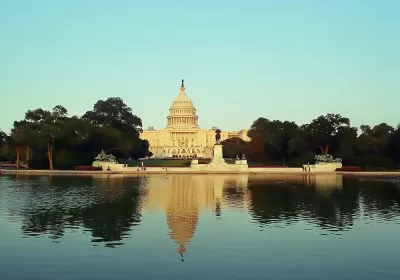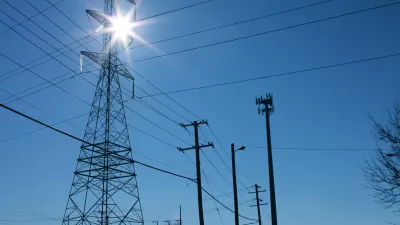You'd think the passage of the $1.2 trillion bipartisan infrastructure act would convey bragging rights for Democratic congress members facing competitive midterm elections today. Ironically, Republicans who opposed the bill are taking credit.

Readers are undoubtedly familiar with the top issues facing voters on Election Day: the economy and inflation, crime, abortion access, threats to democracy, and immigration among them. Infrastructure is rarely, if ever mentioned.
Yet, “Democrats facing voters on Tuesday can boast of a landmark achievement from their two years of running Washington — a $1.2 trillion infrastructure law that promises to rebuild the nation’s roads and bridges, expand broadband service, put more electric vehicles on the road and provide millions of Americans with cleaner drinking water,” write Tanya Snyder, Jordan Wolman, Annie Snider, John Hendel and Eleanor Mueller for POLITICO two days before Election Day.
Biden signed the infrastructure law on Nov. 15, 2021 [related Planetizen post], after it passed with broad bipartisan support in the Senate and just 13 GOP votes in the House. The measure, H.R. 3684 (117), was one of a series of big-spending legislative packages that have marked his administration — including a $1.9 trillion Covid relief bill [American Rescue Plan Act], $52 billion in semiconductor and research subsidies and $300 billion for climate and energy initiatives [Inflation Reduction Act].
Polls show most voters have no idea Congress even passed the legislation — let alone that it’s already set to provide tens of billions of dollars to projects such as rail tunnels under the Hudson River, Everglades restoration work in Florida or a bridge replacement in Tennessee. Meanwhile, Republican lawmakers who opposed the bill have been quick to offer praise and claim credit when their local projects get a share of the cash.
A major reason for the lack of attention to the bill's passage is the time it takes to break ground on specific projects. Furthermore, the authors note that “[m]any of the spending decisions will rest with Republican governors who oppose Biden’s push to use much of the money for projects that counteract climate change or redress the legacies of racial discrimination.”
To date, Washington has pledged just $38 billion of the law’s $1.2 trillion to thousands of individual projects, including $69 million to reconfigure the shoreline at the Port of Alaska in Anchorage and a $25 million bridge replacement in Chattanooga, Tenn.
Partisan Divisions
“One partisan flashpoint was a December 2021 memo from the Federal Highway Administration that pressed state transportation projects [pdf] to avoid spending their new infrastructure money on highway widening, saying they should make it a priority to repair and upgrade existing roads instead,” write Snyder, Wolman, Snider, Hendel and Mueller.
The administration argued this approach will make transportation safer while reducing greenhouse gas emissions.
Sixteen GOP governors lambasted that effort in a letter to Biden as “a clear example of federal overreach [pdf],” noting that the guidance includes restrictions that were intentionally left out of the final bill.
Transportation Secretary Pete Buttigieg later admitted under fire from Republicans in congressional hearings that the memo’s suggestions weren’t binding.
As for Congressional Republicans who voted against the bill's passage taking credit for infrastructure projects in their districts, they assert “that once the law was enacted and the grant money was available, it was their responsibility to advocate for their communities to get their share.”
Hat tip to POLITICO Playbook.
FULL STORY: Biden won on infrastructure. Democrats are struggling to get voters to care.

Maui's Vacation Rental Debate Turns Ugly
Verbal attacks, misinformation campaigns and fistfights plague a high-stakes debate to convert thousands of vacation rentals into long-term housing.

Planetizen Federal Action Tracker
A weekly monitor of how Trump’s orders and actions are impacting planners and planning in America.

In Urban Planning, AI Prompting Could be the New Design Thinking
Creativity has long been key to great urban design. What if we see AI as our new creative partner?

San Francisco Mayor Backtracks on Homelessness Goal
Mayor Dan Lurie ran on a promise to build 1,500 additional shelter beds in the city, complete with supportive services. Now, his office says they are “shifting strategy” to focus on prevention and mental health treatment.

How Trump's HUD Budget Proposal Would Harm Homelessness Response
Experts say the change to the HUD budget would make it more difficult to identify people who are homeless and connect them with services, and to prevent homelessness.

The Vast Potential of the Right-of-Way
One writer argues that the space between two building faces is the most important element of the built environment.
Urban Design for Planners 1: Software Tools
This six-course series explores essential urban design concepts using open source software and equips planners with the tools they need to participate fully in the urban design process.
Planning for Universal Design
Learn the tools for implementing Universal Design in planning regulations.
Gallatin County Department of Planning & Community Development
Heyer Gruel & Associates PA
JM Goldson LLC
Mpact (founded as Rail~Volution)
City of Camden Redevelopment Agency
City of Astoria
Jefferson Parish Government
Camden Redevelopment Agency
City of Claremont





























